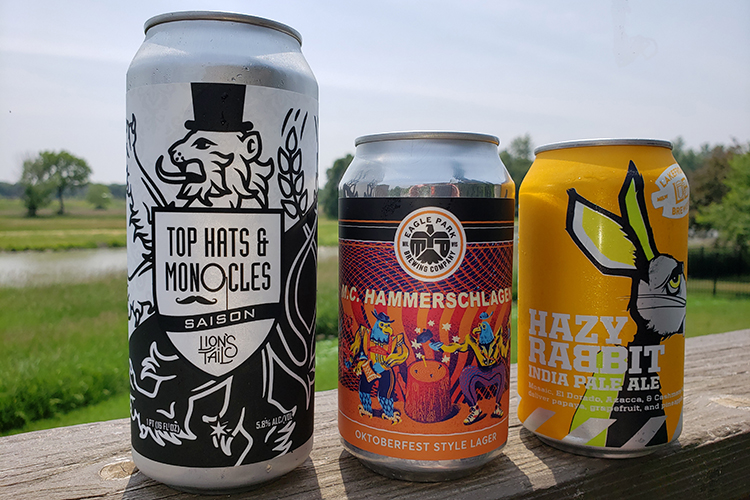Pathological Lager. Tactical Nuclear Penguin. M.C. Hammerschlagen. On the Wings of Armageddon.
Breakout bands touring this summer? No.
These are just some of the thousands of clever, funny, weird, and edgy names of craft beers, which continue to grow in popularity throughout the United States.
According to the Brewers Association, there were 539 American craft breweries in 1994. In 2022, the count stood at 9,552. The craft industry comprises 13.2% of the U.S. beer market by volume, and 24.6% of the market by dollar sales – or $28.4 billion in 2022 craft beer sales.
Breweries are defined as craft breweries if they produce less than six million barrels of beer per year. They are overwhelmingly independently owned.
Stanislav D. Dobrev, Robert L. and Sally S. Manegold Chair in Strategic Management, is an expert in organizational authenticity, and has specifically focused on its relevance in the craft brewing sector.
His research article, “Bottled Up or Poured Out: How Product Name Emotions Affect Appeal and Authenticity in the Market for Craft Beer,” co-authored with Olga Khessina of the University of Illinois Urbana-Champaign and J. Cameron Verhaal of Tulane University, is forthcoming in the journal Strategy Science.
In craft markets such as beer, cheese, or even chocolate, Dobrev says, the appeal to consumers is not just about the producers’ commitment to craft production techniques. It’s perhaps even more about their deep-seeded antagonism toward mass producers, exhibited in a sometimes “rebellious” identity that plays up originality in both process and promotion. There is even a name for this – oppositional craft markets.
Dobrev and his collaborators drew upon established theories of social identity, authenticity, and emotional contagion to posit that organizations that create products which broadcast rebellion through negative emotions – in this case through the names they assign to their beers – resonate more strongly with consumers than those that convey positive emotions.
They tapped into a data set of about 1.1 million unique reviews of almost 42,000 different beers based on online reviews of U.S. craft breweries from the website BeerAdvocate from 1996 through mid-2012.
The researchers looked at whether product names that conveyed either positive or negative emotions were associated with levels of consumer appeal for the product, as well as levels of perceived authenticity.
The findings suggested that consumers in oppositional craft markets don’t care much for names that convey positive emotionality. In fact, Dobrev says, they actually appreciate and are positively influenced by names that evoke negative sentiments.
The study found that consumers perceive negative emotions as sincere, in line with the oppositional, anti-mass production “cultural zeitgeist” of craft markets. In contrast, they perceive positive emotions as manipulative or fabricated, Dobrev says.
As a result, beer names evoking negative emotions raise perceptions of authenticity and appeal, just the opposite to beer names with positive emotions.
For example, evoking positive imagery such as a cool mountain stream might clash with the cynicism of consumers who reject the hallmarks of a mass market approach. Whereas approaches that reject template marketing – such as a quirky name – resonate with consumers in oppositional craft markets.
Dobrev says the findings could have implications for other settings with strong homogenous consumer preferences, such as sports industries with strong home-based fan support or countercultural markets like alternative rock.
| Research@Lubar Faculty scholarship in the Lubar College of Business spans the business fields and beyond through both theoretical and applied research that is published in leading journals. Here are some of our faculty’s most recent publications: |
| Is Audit Partner Identification Useful? Evidence from the KPMG “Steal the Exam” Scandal Auditing: A Journal of Practice & Theory Authors: Lawrence J. Abbott, Russell Barber, William Buslepp, and Pradeep Sapkota |
| Ending Hunger: How COVID-19 Revealed a Path to Food Access for All Journal of the Association for Consumer Research Authors: Melissa G. Bublitz, Katherine M. Du, Jonathan Hansen, Elizabeth G. Miller, and Laura A. Peracchio |
| The Effect of Charity Website Design on Perceived Consistency and its Consequences Internet Research Authors: Dong-Heon Kwan, Derek L. Nazareth, Saerom Lee, Jinwoong Lee, Greta L. Polites, and Deborah Erdos Knapp |
| Click here to see more faculty research |
